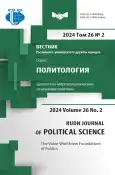The Manipulative Potential of Mass Culture as a Tool for the Political Influence
- Autores: Belov S.I.1,2
-
Afiliações:
- Lomonosov Moscow State University
- Science Institute of Scientific Information for Social Sciences of the Russian Academy of Sciences
- Edição: Volume 26, Nº 2 (2024): The Value-Worldview Foundations of Politics
- Páginas: 254-262
- Seção: SEMANTIC POLICY GUIDELINES: IDEAS, CONCEPTS, THEORIES
- URL: https://journal-vniispk.ru/2313-1438/article/view/322429
- DOI: https://doi.org/10.22363/2313-1438-2024-26-2-254-262
- EDN: https://elibrary.ru/NOCFHI
- ID: 322429
Citar
Texto integral
Resumo
Within the framework of the presented research, the question of the manipulative potential of mass culture as a tool of political influence is raised. The methodology of the work is built based on a combination of elements of comparative, structural and descriptive analysis. The author concludes that popular culture products, even if their creators have purely commercial motives, play the role of a tool for promoting meanings and values and, due to this, are a resource for regulating the behavior and perception of the target audience. The latter turns mass culture into a product of the functioning of the orientational level of the political system. The potential of works of popular culture to develop the effect of emotional contagion contributes to the fact that the impact of broadcast content becomes as wide as possible. The high degree of dependence of the content of cultural narratives on the context and the possibility of free commentary contributes to an increase in the options for their interpretation. The result is the loss by authors and customers of works of full control over the dissemination of transmitted meanings and their interpretation.
Palavras-chave
Sobre autores
Sergey Belov
Lomonosov Moscow State University; Science Institute of Scientific Information for Social Sciences of the Russian Academy of Sciences
Autor responsável pela correspondência
Email: belov2006s@yandex.ru
ORCID ID: 0000-0002-1464-040X
Doctor of Political Sciences, Candidate of Historical Sciences, Associate Professor of the Department of Russian Politics, Faculty of Political Science, Lomonosov Moscow State University; Leading Researcher of Science Institute of Scientific Information for Social Sciences of the Russian Academy of Sciences
Moscow, Russian FederationBibliografia
- Almond, G.A., & Verba, S. (2010). Civic Culture (An Approach to the Study of Political Culture). Journal of political philosophy and sociology of politics “Polity. Analysis. Chronicle. Forecast”, 2(57), pp. 122–144 (In Russian).
- Belyantsev, A.E., & Gershtein, I.Z. (2010). The image of the country through a computer game: historical and political aspect. Bulletin of the Nizhny Novgorod University. N.I. Lobachevsky, 6, 279–283. (In Russian).
- Berger, P., & Luckman, T. (1995). The Social Construction of Reality. Treatise on the sociology of knowledge. Moscow: Medium (In Russian).
- Devine, D.J. (2013). America’s Way Back: Freedom, Tradition, Constitution. Wilmington: ISI Books.
- Donovan, T. (2010). Replay: The History of Video Games. East Sussex, England: Yellow Ant.
- Duverger, M. (2011). Political institutions and constitutional law. Sociology of power, 5, 206–217 (In Russian).
- Easton, D. (2015). An approach to the analysis of political systems. Bulletin of Moscow University. Series 12: Political Sciences, 5, 17–37 (In Russian).
- Eco, U. (1985). On the divisions of the cinematic code. The structure of the film. Some problems in the analysis of screen works (pp. 79–101). Moscow: Raduga. (In Russian).
- Furman, D., & Musgrave, P. (2017). Synthetic experiences: How popular culture matters for images of international relations. International Studies Quarterly, 61, 503–516.
- Lawler, J., & Smith, S. (2021). Reprogramming the history of video games: A historian’s approach to video games and their history. International Public History, 1, 47–54.
- Lotman, Yu.M. (1992). Memory in cultural studies. In Yu.M. Lotman, Selected essays. (pp. 200–202). Tallin. (In Russian).
- Lotman, Yu.M. (1973). Semiotics of cinema and problems of film aesthetics. Tallin: Eesti Raamat. (In Russian).
- Parsons, T. (1997). The System of Modern Societies. Moscow: Aspect-Press (In Russian).
- Ryabov, O.V. (2023). Film images of the enemy in the legitimation of power. In“Enemy number one” in the symbolic politics of cinematography of the USSR and the USA during the Cold War (pp. 162–197). Moscow. (In Russian).
- Schütz, A. (2004). Favorites: A world glowing with meaning. Moscow: ROSSPEN (In Russian). Wertsch, T. (2019). The endless war with echoes and ghosts: Collective memory, national identity, and the new frontier of american films and video games. Historical Expertise, 4(21), 25–41. (In Russian).
- Yudin, K.A. (2021). Chords of the Cold War: Music as a resource for representing the “image of the other” in Anglo-American cinema. Izvestiya of Saratov University. History. International relations, 21(3), 353–358. (In Russian). https://doi.org/10.18500/1819-4907-2021-21-3-353-358
Arquivos suplementares









